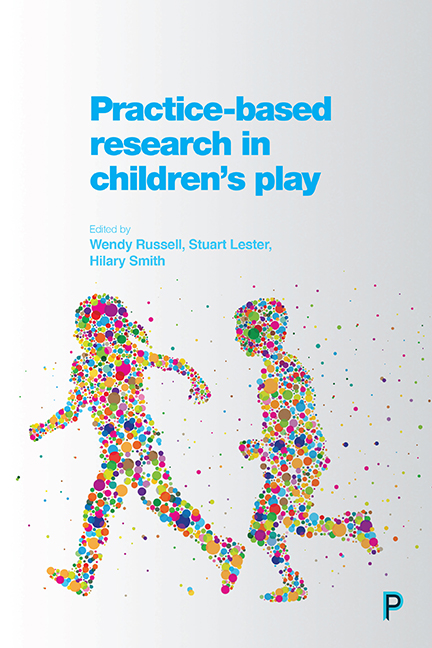Book contents
- Frontmatter
- Contents
- List of figures
- Notes on contributors
- Acknowledgements
- Foreword
- One Perspectives on play research: the practice-theory-research entanglement
- Part One Then and now: historical perspectives
- Part Two Here and there, this and that: spatial and creative perspectives
- Part Three Playfulness and wellbeing
- Closing thoughts
- Appendix: The Playwork Principles
- Index
One - Perspectives on play research: the practice-theory-research entanglement
Published online by Cambridge University Press: 05 April 2022
- Frontmatter
- Contents
- List of figures
- Notes on contributors
- Acknowledgements
- Foreword
- One Perspectives on play research: the practice-theory-research entanglement
- Part One Then and now: historical perspectives
- Part Two Here and there, this and that: spatial and creative perspectives
- Part Three Playfulness and wellbeing
- Closing thoughts
- Appendix: The Playwork Principles
- Index
Summary
“I wish I’d done this 20 years ago, but none of this stuff was written then. It's done amazing stuff for my practice and my interest in children's play.” (From a conversation with contributors)
For me it was like I’d suddenly found the exact subject area I was really passionate about. I have been skating on the edges and thought that I knew what path I wanted to be on but the more I read the more I realised this was the material that I was interested in…Doing action research suited my needs of wanting to develop this further, a selfish hunger pang for knowledge and the self-reflection opportunity. It inspired me, considering I was at the end of part time studying and the balancing act of work, family life and studying, it still intrigued me and gave me the energy to research (and continue to research and develop my own self-reflection). (Email from one of the contributors)
The ideas I am drawn to are those that seem most relevant to my way of thinking and mainly this has been the nonrepresentational, post humanist stuff, which though often convoluted and abstract seems most pertinent to current thinking about public space and playfulness. When I think of my practice in terms of urban design (and all the negotiations and politics that this involves) then I can see how this theoretical knowledge and research can be relevant and practically useful. But when I am engaged in the creative design process itself then I am not sure that knowing the theory comes into it. On the other hand, play (and art) is a form of research in its own right and perhaps this is more a question of language and what we mean by knowledge – text versus affect? And then again text affects…at this point words start to wobble…loop the loop…giggle… (Email from one of the contributors)
Every book has a number of stories behind it, and this introductory chapter aims to tell some of the stories behind this one. They are stories of shared explorations not only of children's play and adults’ relationships with it, but also of knowledge itself, and the entanglements of theory, research and practice.
- Type
- Chapter
- Information
- Practice-Based Research in Children's Play , pp. 1 - 16Publisher: Bristol University PressPrint publication year: 2017



